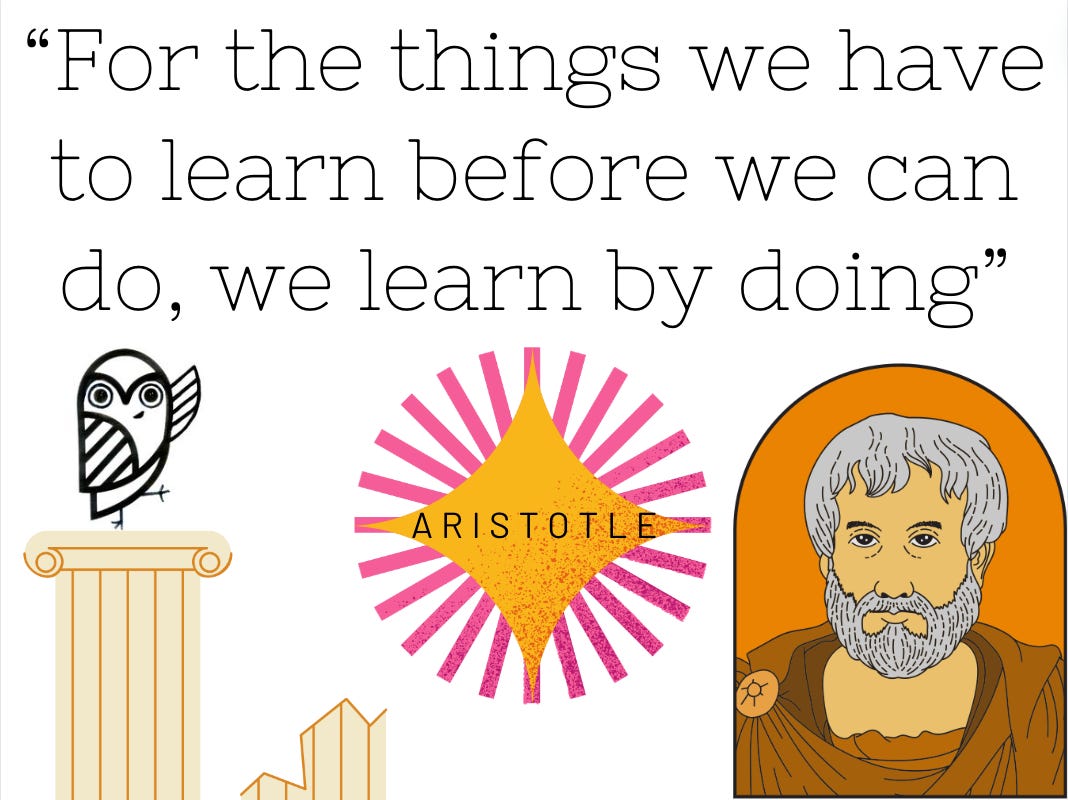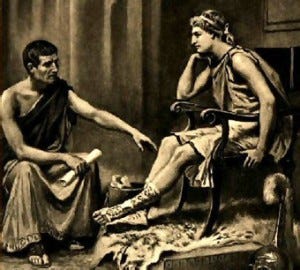Dear Classical Wisdom Kids,
First, a quick clarification. I’ve had a few readers write in a bit confused to what belongs to what in the growing world of Classical Wisdom.
Fair dinkum as they say ‘Down Under’.
About a year ago we launched Classical Wisdom KIDS, to help bring ancient wisdom to future minds. The thing is a lot of the ideas, history and concepts obviously work just as well as for adults.... And now with our new “Ancient Greek Word of the Greek”, I fear the lines have been further blurred.
Classical Wisdom and Classical Wisdom KIDS are separate projects. So if you are a member of one, you are not automatically a member of the other.
Of course everyone is welcome to enjoy our Classical Wisdom KIDS newsletter! If you see the YELLOW banner above, then you know it’s our KIDS issue, not Classical Wisdom.
Now... onto our task at hand: Introducing the ancient Greek philosopher, Aristotle, to the next generation.
Our plan this year is to cover a new ancient person every month and delve into their life, works, ideas and legacy. Last month we covered Plato... so naturally, this month we will look into his student, the one and only Aristotle!
So please enjoy this issue below on “Who was Aristotle?”
Also, Classical Wisdom KIDS Club Members, we have some fun activities in store for you to help encourage the important activity of observation, notation and classification. Discover the natural world...just like Aristotle!
Subscribe now to enjoy our Classical Wisdom KIDS Club resources. Including worksheets, activities and more:
As always, please feel free to give us feedback, ideas, hopes, dreams and more!
All the best,
Anya Leonard
Founder and Director
Classical Wisdom and Classical Wisdom Kids
Who Was Aristotle?
Aristotle was an ancient Greek philosopher, scientist, and polymath. He was an extremely famous student... and a teacher! He wrote about so many different ideas and is one of the most influential thinkers in human history.
But who was he?
Aristotle was born in a city in Macedonia. His father was the doctor to the king of Macedonia. No wonder Aristotle liked biology and natural sciences!
At the age of 17, Aristotle moved to Athens to become Plato’s student at Plato's Academy. He was there for almost 20 years, until Plato died. Afterwards, Aristotle left Athens and traveled a lot, including to the island of Lesbos. There he did amazing scientific research and studied hundreds of different animals. He did this by looking at them very, very carefully and making notes.
Later he traveled back to Macedonia to teach Alexander the Great, who was then only a teenager. Aristotle taught the future king philosophy, politics, ethics, science, and literature.
Aristotle returned to Athens and founded his own school, the Lyceum. His teaching involved walking around the peripatos (covered walkway). This is why they were called a "Peripatetic School”.
Aristotle died at the age of 62 in his mother’s town, Chalcis.
Aristotle spent his life seeking knowledge. He had an insatiable curiosity about the natural world and wanted to understand how things worked.
Aristotle wrote about so many things, including philosophy, logic, ethics, politics, biology, and metaphysics. His ideas have had a huge influence on the development of Western thought. Aristotle is a very important philosopher to know... aren’t you glad you know about him now?
Let Little Readers Read!
Download the printable lesson, complete with word bank:
Timeline:
384 BCE: Aristotle was born
367 BCE: Aristotle moved to Athens and became a student at Plato's Academy
347 BCE: Plato died and Aristotle left Athens
343 BCE: Aristotle tutored Alexander the Great, when he was around 13 years old
335 BCE: Aristotle returned to Athens and founded the Lyceum
322 BC: Aristotle died
Review:
Who was Aristotle?
Who was his father?
Who was Aristotle’s teacher?
What did Aristotle do on the island of Lesbos?
Who did Aristotle teach?
What was Aristotle’s school called?
Discussion:
Why should we learn about Aristotle?
Why do you think he has had so much impact?
What are some of the fields of study Aristotle wrote about?
How did Aristotle try to understand the natural world?
What can we do to be like Aristotle?
Classical Wisdom KIDS Member:
Next week Classical Wisdom Kids can explore the natural world... just like Aristotle! Watch this space…







